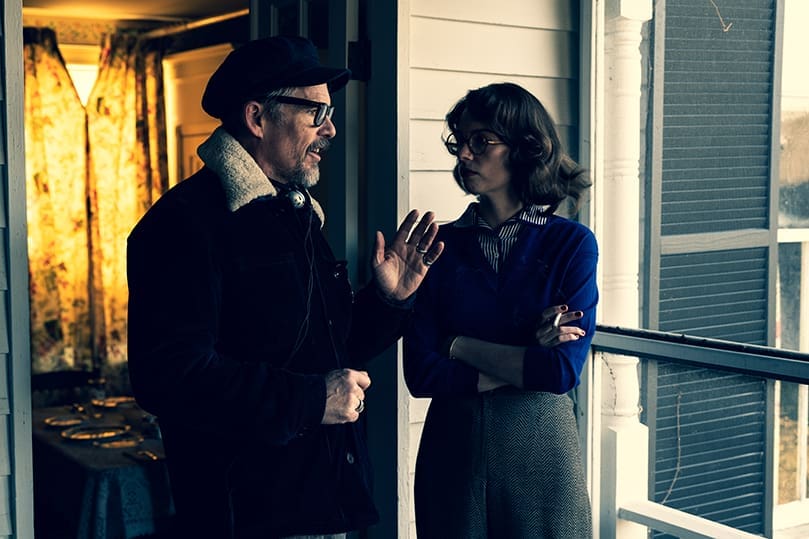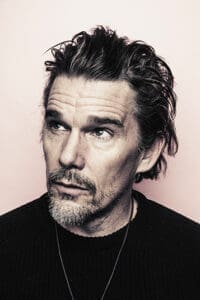 Photo Courtesy of Oscilloscope
Photo Courtesy of OscilloscopeAtlanta
Flannery O’Connor’s life and faith serve as inspirations for new film
By ANDREW NELSON, Staff Writer | Published May 21, 2024
ATLANTA—A sold-out theater full of Flannery O’Connor fans heard from director/writer Ethan Hawke and leading actor Maya Hawke about their collaboration in the new biopic “Wildcat.” The film celebrates one of Georgia’s most famous authors.
The genesis of the story came from Maya Hawke, the daughter of the four-time Academy Award nominee. She fell in love with O’Connor’s “A Prayer Journal” and used it for her audition to The Julliard School. Later, she pitched the idea of making a film to her father.
The two spoke to more than 300 people on May 9 at Atlanta’s Plaza Theater. They talked for nearly 45 minutes, as theater owner Chris Escobar led a Q&A session.

Director Ethan Hawke
Instead of a traditional biography, the filmmaker said he wanted to create a story “about the integration between imagination, faith and reality.”
O’Connor is a “very devout woman with incredible, disciplined faith, and it produced this beautiful art where her brain took her. And we wanted to try to make a meditation on that idea,” said Hawke, sitting at the foot of the theater.
Hawke described himself as “a closet Christian” who grew up in a household with an Episcopal mother and a Catholic stepfather. He said O’Connor, along with other Catholic authors such as monk Thomas Merton, were among the books discussed in his home. As a young man in his 20s, he attended retreats at the Abbey of Gethsemani, Merton’s monastery.
But as a parent, he had not exposed his children to the same upbringing. Hawke admitted he felt like a failure about the missing spiritual education. That’s why he felt moved to be invited to make the film with his daughter, he said.
“I do think it’s so powerful for people when they find it on their own, you know, when you make discoveries on your own versus your parents,” he said.
In writing the story, Hawke said he and his collaborator, Shelby Gaines, let the author’s voice from her journals, short stories and novels create the narrative. He said the storyline comes from “curated dialogue” created by O’Connor, then made into the script.
“I’m telling her life as an artist. I’m going to let her speak about what she has to say about it, and I’m going to let her talk about her faith,” said Ethan Hawke. “I’m going to let her talk about her mom, and I’m going to let her talk about writing. That was difficult to do, but it was really fun, and it was an invitation.”
For her part, Maya Hawke said the filmmaking and O’Connor’s writing reinforced the respect for the Catholic faith she saw come from her Buddhist grandfather. In doing the film and getting to embody O’Connor’s characters and values, “I understood where that respect came from, and it grew equally.”
 On a practical level, Hawke said during the filming she became familiar with the rosary and its prayer.
On a practical level, Hawke said during the filming she became familiar with the rosary and its prayer.
An actor and musician, Maya Hawke was part of the cast in the Netflix hit drama “Stranger Things.” In “Wildcat,” she takes on the role of O’Connor, in addition to bringing to life multiple characters from the author’s acclaimed short stories.
At 25, she is the same age when O’Connor was when diagnosed with lupus. Asked if the shared age helped the actor connect with the character, Hawke said she shared the author’s desire to be both great but modest about it. Her creativity was fueled by “complete self-hatred and complete ambition at the same time,” Maya Hawke said, reflective of her own teen years.
The actors said the film was a passion project, a film that may not draw in a big audience as a blockbuster but is a story that reflects O’Connor’s unique vision of art, creativity and faith.
“Flannery, through her faith, was seeing things,” said Ethan Hawke. “Seeing things that a lot of white people in our community were not seeing about themselves and their hypocrisy about what it means to be a woman, what it means to be a man. She was seeing things, and she offered us the chance to see them, too. And I guess it did open a door for me.”
Editor’s Note: From 1956 to 1964, Flannery O’Connor regularly contributed book reviews to The Georgia Bulletin and to its predecessor, The Bulletin. You may read them: https://bit.ly/GB-floconnor